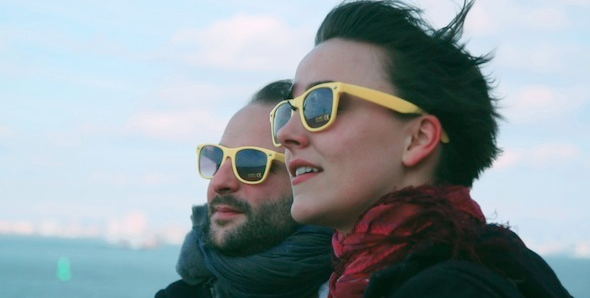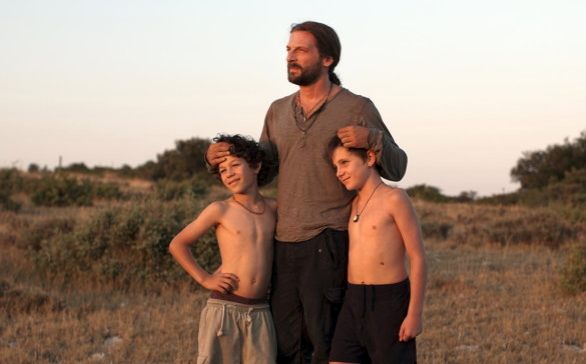By providing your information, you agree to our Terms of Use and our Privacy Policy. We use vendors that may also process your information to help provide our services. This site is protected by reCAPTCHA Enterprise and the Google Privacy Policy and Terms of Service apply.
5 Must-See New French Films From Rendez-Vous with French Cinema

READ MORE: Exclusive Poster and Trailer for FSLC and UniFrance’s Rendez-Vous with French Cinema
Extending beyond the milieu of bougie dinner parties, Rendez-vous’ latest installment showcases a cross section of the country that’s as diverse as it’s landscapes—from the Parisian skyline to the idyllic Southern countryside to gritty urban housing projects—and cinephiles will be pleased to find that a host of young French talent has prime billing alongside iconic heavyweights.
“Breathe”
 Among the highlights this year is “Breathe,” the second directorial effort from actress Melanie Laurent (“Inglourious Basterds”). Ostensibly a coming-of-age tale, the film traces the volatile friendship between a pair of 17-year-old “jeune filles”: the reserved Charlie (Joséphine Japy) and the precocious new girl at school, Sarah (Lou de Laâge). Laurent has structured the film as a classic seduction. Think “Blue is the Warmest Color” but without any actual sex. As Sarah wins Charlie over with flirtatious affection and infectious charisma, languorous sequences of the inseparable teens frolicking through fields and whispering in bed make it seem as if they’re the world’s only inhabitants. But beneath the schoolgirl currency of giggles and secrets, Laurent subtly lays the ground work for the dark psychological thriller “Breathe” gradually becomes—the film’s title references the panic attacks that leave Charlie winded as Sarah tightens her parasitic grip.
Among the highlights this year is “Breathe,” the second directorial effort from actress Melanie Laurent (“Inglourious Basterds”). Ostensibly a coming-of-age tale, the film traces the volatile friendship between a pair of 17-year-old “jeune filles”: the reserved Charlie (Joséphine Japy) and the precocious new girl at school, Sarah (Lou de Laâge). Laurent has structured the film as a classic seduction. Think “Blue is the Warmest Color” but without any actual sex. As Sarah wins Charlie over with flirtatious affection and infectious charisma, languorous sequences of the inseparable teens frolicking through fields and whispering in bed make it seem as if they’re the world’s only inhabitants. But beneath the schoolgirl currency of giggles and secrets, Laurent subtly lays the ground work for the dark psychological thriller “Breathe” gradually becomes—the film’s title references the panic attacks that leave Charlie winded as Sarah tightens her parasitic grip.
There’s a telling scene early on in the film where Charlie’s English teacher tries to engage his lackluster students in a healthy philosophical debate about the pros and cons of passion. Borrowing from Nietzsche, the class concludes that the emotion only becomes dangerous when it escapes rational control. Though the lesson is a little too on the nose, it aptly foreshadows the unstoppable force of Charlie’s base instincts that ultimately engulf her and, more importantly, underscores a recurring theme in this year’s program: passion running amok.
“Stubborn”
 Is there any actor better equipped to tow the line between obsession and psychopathology than Vincent Macaigne? Upping the anti from his performance in last year’s “Tonnere” (Guillaume Brac), the actor is once again cast as a besotted lover cum borderline stalker in Armel Hostiou’s “Stubborn.” Following his ex-girlfriend Barbara (Kate Moran) to New York, the ultra disheveled Vincent (Macaigne) can’t seem to take a hint that their relationship has long been over—even after she buys him a ticket back to France and moves in with another man (Murray Bartlett). “You tire me out more than you make me laugh,” she tells him in an early attempt to let him down gently.
Is there any actor better equipped to tow the line between obsession and psychopathology than Vincent Macaigne? Upping the anti from his performance in last year’s “Tonnere” (Guillaume Brac), the actor is once again cast as a besotted lover cum borderline stalker in Armel Hostiou’s “Stubborn.” Following his ex-girlfriend Barbara (Kate Moran) to New York, the ultra disheveled Vincent (Macaigne) can’t seem to take a hint that their relationship has long been over—even after she buys him a ticket back to France and moves in with another man (Murray Bartlett). “You tire me out more than you make me laugh,” she tells him in an early attempt to let him down gently.
A hopeless romantic in-extremis, Vincent is indeed exhausting to be around. Clinging to the idea that he can still win Barbara back, he mopes around the city showing her picture to every stranger willing to indulge his self-pity and weather his rough English. Appearing in nearly every frame, it’s Macaigne’s painfully forlorn humor that carries the film, even if his naturalistic acting frequently feels at odds with the melodramatic scenarios his character finds himself in. It’s hard to resist mentioning a scene in which he shows up at his ex’s apartment, nose bloodied and stuffed with cotton, and demands her new boyfriend squeeze him a fresh glass of orange juice—the stuff in the carton is “chemical shit,” he explains with a straight face. The film’s titular adjective is putting it mildly—Vincent is willfully oblivious to all social cues, but that’s what makes him so grotesquely captivating to watch.
READ MORE: Watch: Jean Dujardin Goes Bang Bang in NSFW ‘The Connection’ RedBand Trailer
“Wild Life”
 A study of civilization and its discontents, Cédric Kahn’s “Wild Life” similarly finds it’s main character, Paco (Mathieu Kassovitz), deliberately living outside the restraints of social and economic conventions. Happily raising his sons as nomads on the fringes of society, when his wife Nora (Céline Sallette) suddenly changes her tune in the name of giving her kids a better life in the city, Paco disregards the court’s custody order and heads for the hills with the two boys happily in tow. Despite the fact that they’re living as outlaws, his sons seem to thrive in the wild—they run freely through woods gleefully catching and skinning rabbits and plucking chickens on whichever commune they happen to be living. But with adolescence comes the awareness that their freedom is merely another form of imprisonment.
A study of civilization and its discontents, Cédric Kahn’s “Wild Life” similarly finds it’s main character, Paco (Mathieu Kassovitz), deliberately living outside the restraints of social and economic conventions. Happily raising his sons as nomads on the fringes of society, when his wife Nora (Céline Sallette) suddenly changes her tune in the name of giving her kids a better life in the city, Paco disregards the court’s custody order and heads for the hills with the two boys happily in tow. Despite the fact that they’re living as outlaws, his sons seem to thrive in the wild—they run freely through woods gleefully catching and skinning rabbits and plucking chickens on whichever commune they happen to be living. But with adolescence comes the awareness that their freedom is merely another form of imprisonment.
The subtle strength of Kahn’s film lies in its temporal breadth; brief flashes to Nora and Paco’s idyllic early years reveals as many good intentions as bad mistakes and as audience sympathies shift from character to character, the director erodes all clear cut notions of right and wrong in favor of impossible moral and emotional complexities.
“Gaby Baby Doll”
 Also set in the French countryside, though much more lighthearted in tone, is Sophie Letourneur’s “Gaby Baby Doll.” A playful examination of crippling neuroses, the film’s bubbly but anxious titular character (played by Lolita Chammah) is physically unable to sleep alone. So when she’s abandoned by her boyfriend and left to her own devices in a giant empty house on the outskirts of a small rural town, she panics and heads straight for the local bar in search of a bedmate. Make no mistake: when she invites townie after townie to sleep beside her, sex is the furthest thing from her mind. After exhausting all other resources, Gaby imposes herself on Nicolas (Benjamin Biolay), the hirsute caretaker of a neighboring property who prefers a solitary existence. “Walks are taken silently,” he tells her when she follows him like a lost puppy on his regular morning jaunt.
Also set in the French countryside, though much more lighthearted in tone, is Sophie Letourneur’s “Gaby Baby Doll.” A playful examination of crippling neuroses, the film’s bubbly but anxious titular character (played by Lolita Chammah) is physically unable to sleep alone. So when she’s abandoned by her boyfriend and left to her own devices in a giant empty house on the outskirts of a small rural town, she panics and heads straight for the local bar in search of a bedmate. Make no mistake: when she invites townie after townie to sleep beside her, sex is the furthest thing from her mind. After exhausting all other resources, Gaby imposes herself on Nicolas (Benjamin Biolay), the hirsute caretaker of a neighboring property who prefers a solitary existence. “Walks are taken silently,” he tells her when she follows him like a lost puppy on his regular morning jaunt.
Like both her previous films “La Vie au Ranch” (2009) and “Les Coquilettes” (2012), “Gaby” relies heavily on the artful repetition of images and sequences: the plot doesn’t so much develop as it accumulates. No matter how much her clogs stick in the mud, Gaby dutifully trots alongside Nicolas on his daily walks (pausing to freely pee trailside, much to Nicolas’ disgust) and day-by-day the two become increasingly bound to one another.
Although it similarly deals with anxieties surrounding independence and co-dependence, compared to the naturalism of Letourneur’s previous two films “Gaby” feels decidedly mannered: the quirks wear the characters rather than the other way around. Nevertheless, the film’s sweet and sexless romance manages to charm—particularly in the farcical third act twist.
“3 Hearts”
 A missed rendezvous takes on grave dramatic consequences in “3 Hearts.” Jacquot’s follow-up to “Farewell My Queen,” the film’s set up resembles Linklater’s “Before Sunrise”: two strangers, Marc (Benoît Poelvoorde) and Sylvie (Charlotte Gainsbourg), meet, fall in love, arrange a tryst without exchanging information, and are heartbroken when they each think the other one hasn’t shown up. Sylvie moves to America with her boyfriend immediately following the mix-up and Marc unwittingly begins dating Sylvie’s sister, Sophie (Chiara Mastroianni), whom he eventually marries.
A missed rendezvous takes on grave dramatic consequences in “3 Hearts.” Jacquot’s follow-up to “Farewell My Queen,” the film’s set up resembles Linklater’s “Before Sunrise”: two strangers, Marc (Benoît Poelvoorde) and Sylvie (Charlotte Gainsbourg), meet, fall in love, arrange a tryst without exchanging information, and are heartbroken when they each think the other one hasn’t shown up. Sylvie moves to America with her boyfriend immediately following the mix-up and Marc unwittingly begins dating Sylvie’s sister, Sophie (Chiara Mastroianni), whom he eventually marries.
Cast as Sylvie and Sophie’s mother, Deneuve (who is Mastroianni’s mom in real life) is unfortunately not given much to work with here beyond a few knowing glances at the dinner table that suggests she’s intuitively aware of the secret love triangle, and in spite of an all round impeccable cast, the drama frequently feels like it’s being forced onto the characters. A narrator’s voice sporadically pops up to provide superfluous information, the music feels better suited to a thriller, and Marc’s delay in putting two and two together causes the narrative tension to dissipate rather than build.
Thankfully the characters align with the plot in the film’s second half, allowing for an emotionally engrossing third act with a painfully poignant ending that does justice to the players’ enormous talents. At it’s best, “3 Hearts” is a touching treatise on what is and what might have been.
READ MORE: Watch: Trailer for FSLC’s 20th Rendez-Vous with French Cinema Demands ‘Regardez Moi!’
By providing your information, you agree to our Terms of Use and our Privacy Policy. We use vendors that may also process your information to help provide our services. This site is protected by reCAPTCHA Enterprise and the Google Privacy Policy and Terms of Service apply.















